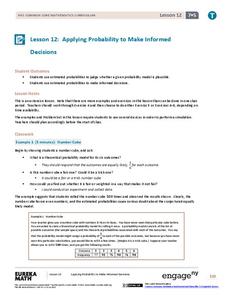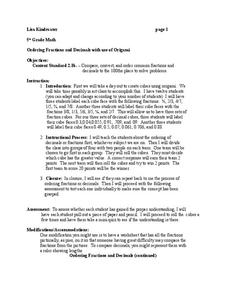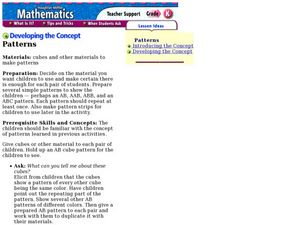Math Mammoth
Geometry Problems
In this math worksheet, middle schoolers find the area of the triangles, the perimeter of the irregular shape, and the diagonal of the cube.
Curated OER
Shape Flashcards
In this geometry worksheet, students will cut out and practice 12 shape flashcards. The shapes include the basic plane shapes plus star, heart, diamond, cube and cylinder.
Curated OER
The Real Number System: Rational or Irrational
In this real numbers worksheet, students determine if 14 expressions when simplified are rational or irrational. Students take the square and cube roots of numbers to determine if the result is rational or irrational.
Curated OER
An Algebra Curiosity
For this algebra worksheet, 9th graders analyze 2 problems to figure out why the result is always a perfect cube. There is an answer key to this problem.
Curated OER
Quadratics and Difference of Squares
For this algebra worksheet, students factor quadratic equations using the difference of squares and cubes. They factor other polynomials finding the roots. There are 37 questions with an answer key.
Curated OER
Geometric Shapes: Shapes in Everyday Items
Which item is shaped like a cone? Use this multiple-choice shape recognition worksheet to give students access to shapes in their everyday life. Four questions ask scholars to identify which of the pictured items is shaped like a sphere,...
EngageNY
Calculating Probabilities for Chance Experiments with Equally Likely Outcomes
Calculate theoretical probabilities and compare them to experimental probabilities. Pupils build on their knowledge of experimental probabilities to determine theoretical probabilities. Participants work several problems with the...
EngageNY
Applying Probability to Make Informed Decisions
Use simulations to determine the probabilities of events to make decisions. Class members are presented with several scenarios, some with known probabilities and others without. Groups run simulations to gather data that they then...
Curated OER
I Have a Magic Pot
Pupils will explore numbers rules. They will create a picture of their rule and exchange their paper with a classmate. The classmate works to figure out the rule. They then share with each other how they found the rule. Questions are...
Curated OER
Classifying Three-Dimensional Shapes
Compare geometric solids based on their properties. Your emergent geometers use spaghetti and marshmallows to build models so they can examine the number of faces, edges, and vertices on polyhedra of their own creation. Resource includes...
EngageNY
Conducting a Simulation to Estimate the Probability of an Event
How can you complete a simulation when it is not practical to determine the probability of an event? Class members learn that in some situations, it is not feasible to find the probability of an event, but they can estimate it by running...
Curated OER
Ways to Make 7 and 8
In this adding to seven and eight word problem worksheet, learners use cubes to total numbers. Students solve six word problems.
Charleston School District
Solving for a Missing Dimension
If a can has a volume of twelve ounces, how tall it should be? If you can work with volume formulas, it's is an easy measurement to find. After finding the volume of figures in the previous lesson of the series, learners now...
Virginia Department of Education
Surface Area and Volume
Partners use materials to wrap three-dimensional objects to determine the formula for surface area. The groups use an orange to calculate the amount of peel it takes to completely cover the fruit. Using manipulatives, individuals then...
Curated OER
More, Less, and Equally Likely
In this math making predictions instructional activity, students solve 3 math word problems that require them to make predictions based on the information presented.
EngageNY
Exponents
Powered up! Here's a great resource on exponents. Scholars build on their previous understanding of exponents to include all positive real number bases. Distinguishing between an and a^n is a major goal in the fifth instructional...
Houghton Mifflin Harcourt
Place Value to 1,000
Second graders stack cubes and learn how to group them in order to understand place value.
Curated OER
Number: Index Notation
Students explore the concept of index notation. In this square root and cube root lesson, students examine number patterns as they complete a worksheet that requires them to calculate roots.
Curated OER
Togetherness
In this counting activity, students analyze a long linked series of cubes in two colors. Students count one color of cubes and record that number. Students then count the other color of cube and do the same. Finally, students write the...
Curated OER
Ordering Fractions and Decimals with use of Origami
Fifth graders play a game using origami cubes with fractions and decimals written on them. In this ordering lesson, 5th graders order the fractions and decimals while earning points for their team.
Curated OER
TAKS Quiz-Probability of Drawing One Item
In this TAKS math quiz worksheet, students take an online quiz focused on the probability of drawing one item. Quiz may be graded online by clicking a link.
Curated OER
Incomplete Plans
Students practice constructing a building utilizing snap cubes and an incomplete building plan and draw the missing view. They identify and compare relationships in two and three-dimensional representations/objects. Each student explains...
Curated OER
Developing the Concept: Patterns
Students understand what a pattern is and how to make a pattern. In this pattern instructional activity, students use cubes to create various patterns. Students recognize the pattern created.
Curated OER
Hooray for Arrays!
In this math game activity worksheet, students use their problems solving skills as they play a math game in order to review arrays.

























